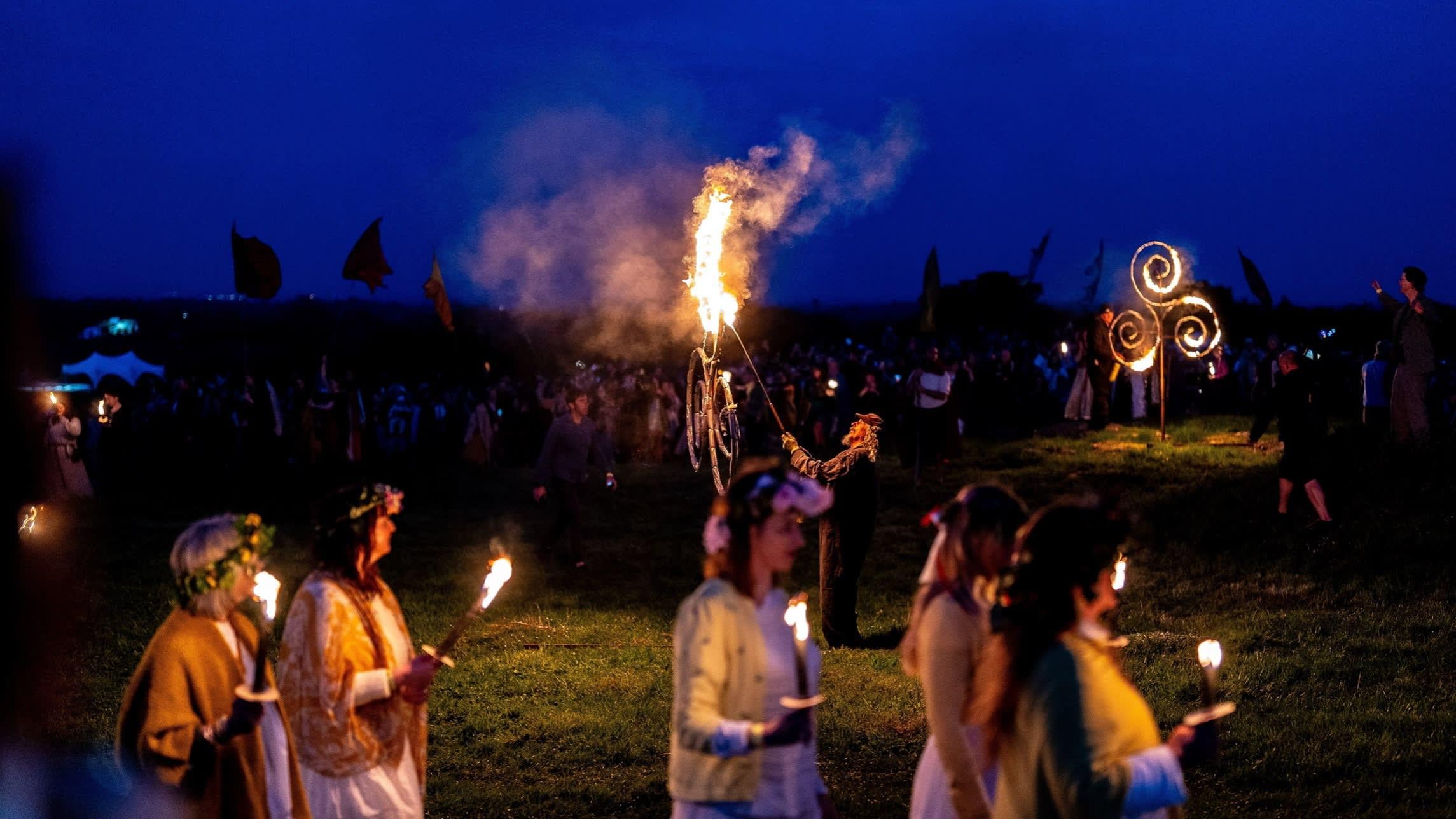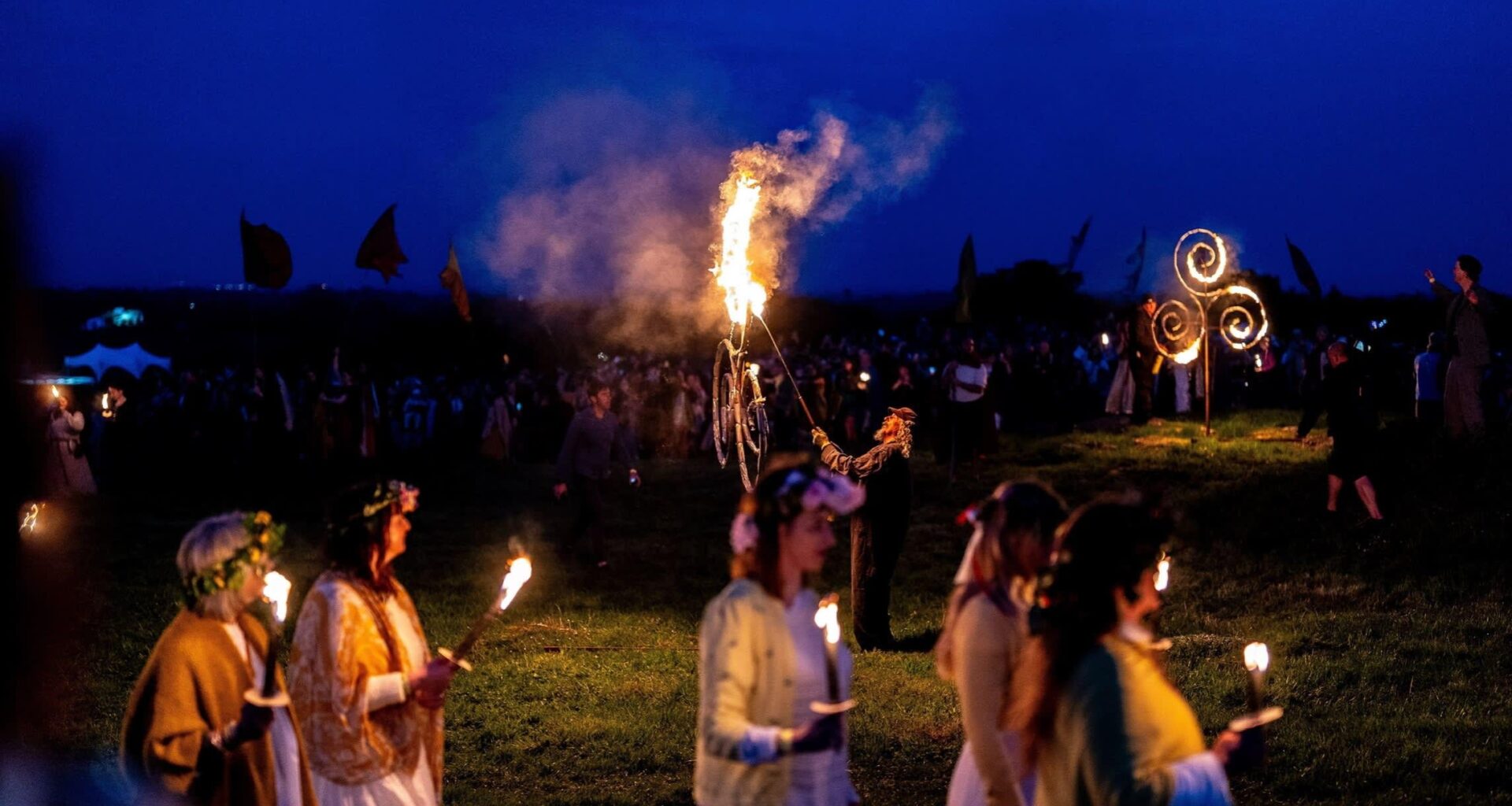
https://www.ft.com/content/03d86e54-ce6e-4fa0-9c01-d6ff0b150d8d
‘Not a wake but a hurlamaboc’: Manchán Magan and the rise of the Irish language
Ireland’s ancient language and folklore are having a renaissance. For the Celtic-curious, Magan, who died last week, is a wonderful place to start
Five years ago, a book about lost Irish words and their intimate connection to the Celtic nation’s physical landscape and spiritual hinterland of fables and fairies was considered — even by its publisher — to be a bit niche.
Gill Books ordered just 5,000 copies for the first print run of Thirty-Two Words for Field by Manchán Magan, a travel writer and documentary maker who, by his own admission, was an “oddball loner” and societal misfit who built a home from bales of straw and was enraptured by Ireland’s magical realm.
But it became an unexpected smash. Within four months, Thirty-Two Words had sold 24,500. Sales have now passed 62,000. Tomás Kenny, who runs an independent bookshop in Galway in western Ireland, says that Magan was at the forefront of highlighting the question, “Why should we be leaving these things in the past? This is who we are, this is what we are and it’s where we came from.” Magan tapped into something, Kenny says. “The Irish language has never been as cool as it is at the moment.”
Ireland’s poetic ancient language, hammered by colonialism, famine and emigration, is now spoken fluently by few, its use once a defiant political statement, especially north of the border, or a cultural marker on an island still riven by tribal identity politics. For some, Magan among them, it also unlocks a wider world of mysticism, but for many, the republic’s first official language has been reduced to a smattering of cherished stock phrases.
Magan, who died of cancer last week aged 55, helped rekindle curiosity and real pride in the quirky etymology of Irish and its role as a portal into a profound heritage at a time when Ireland’s cultural stock has never been higher.
“I am constantly just so excited by the cultural ‘Green Wave’ as some people call it,” said Evelyn O’Rourke, arts and media correspondent for national broadcaster RTÉ. “We just assume we’re going to get Oscar nominees . . . [that] someone is going to win a Booker Prize. That’s extraordinary for a country that decades ago was economically so compromised and so vulnerable . . . The confidence in our cultural work is really, really impressive.”
Many have credited Ireland’s oral storytelling tradition with helping make it a literary and creative superstar, delivering not only novelists considered among the finest writing in English today but also the punk energy of Belfast rap trio Kneecap, who perform mostly in Irish.
For the author John Banville, Ireland’s literary excellence is “revenge” for colonialism, in which the imposition of English, a language of command and clarity on “dreamy” Irish, delivered a “mode of evasion . . . and out of that came wonders”.
In 2018 — the year Sebastian Barry, who has been nominated for the Booker prize five times, hailed a “golden age of Irish prose writing, with writers speckling a night sky with stars of peculiar luminosity” — Anna Burns won the Booker for Milkman and Sally Rooney published Normal People. In 2023, Paul Lynch won the Booker with Prophet Song, joining past Irish laureates Burns, Anne Enright, Roddy Doyle and Banville, and following in the footsteps of other modern literary icons such as Edna O’Brien and John McGahern.
Magan’s infectious enthusiasm through his books and documentaries — often in Irish — helped champion a new appreciation for Irish folklore which has also been translated into literature, such as in Enright’s novel The Wren, The Wren. For Éilís Ní Dhuibhne, laureate for Irish fiction, “Manchán Magan did a great deal — putting it out there in a new guise, in a way that was trendy.”
Renewed pride in Irish has spurred a nearly 100 per cent growth in students educated through it in the past two decades. Darach Ó Séaghdha, author of Motherfoclóir: Dispatches from a Not-So Dead Language and Craic Baby: Dispatches from a Rising Language, said Irish names replete with silent letters are now embraced: “When the Celtic Tiger happened [Ireland’s mid-1990s to mid-2000s economic boom], people thought, ‘My children won’t need to emigrate. I don’t need to give them a name that’ll translate.’”
For the Celtic-curious, Magan is a wonderfully accessible place to start. Magan “freed people up to enjoy the language . . . in a very charming way, never lecturing”, O’Rourke said.
Since his death on October 2, just weeks after publication of 99 Words for Rain (and One for Sun), Kenny has seen “huge interest” in Magan’s books — including from Japan and Kazakhstan. President Michael D Higgins lauded him for “opening up our collective heritage to more people than could ever have been imagined”.
Magan’s epitaph for his beloved lost Irish words is all the more poignant given his untimely death. He saw Thirty-Two Words not as a wake but “a hurlamaboc (‘rambunctious celebration’)”, adding: “I am not despairing about the gradual fading of the richness of the language because Irish is as much a story as a language, and most stories never really die.”
by vague_intentionally_

6 comments
I was listening to Blindboy Boatclub’s podcast last night where he replayed his first conversation with Manchán, fucking hell what a life well lived.
>*Ireland’s ancient language and folklore are having a renaissance.*
the language will be dead within a generation
fewer and fewer kids are growing up speaking it
people in Belfast and Dublin sending kids to gaelscoils is irrelevant in the greater scheme of things if there are no native speakers left
Regrettably fairly ignorant to the man until his death, beyond the odd interview or podcast. But by Jesus he lead some life. He seemed to just be in relentless pursuit of learning, and did so with humility and tolerance for everyone he encountered. ‘Took too soon’ is a phrase often bandied about those who have recently passed, but it sadly seems so fitting for him.
Years ago he did a program where he tried to get around the country with as little Irish as possible. He stopped by in Belfast so there’s a glimpse of some of the Irish in West Belfast in the 00s: [https://www.youtube.com/watch?v=os5MA6jA2wc](https://www.youtube.com/watch?v=os5MA6jA2wc)
He was quite pessimistic at the time of that show about the chances of the language but with the success of his later books and the energy that built up over the last decade turned him into a far more optimistic man overall.
A cultural giant who left us far too soon, his writings are an incredible insight into how our identities link in with the land we live in
Celtic-curious? Is that like bi-curious?
Comments are closed.